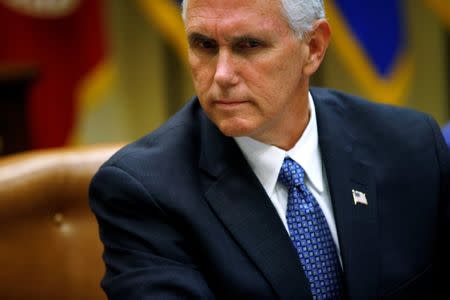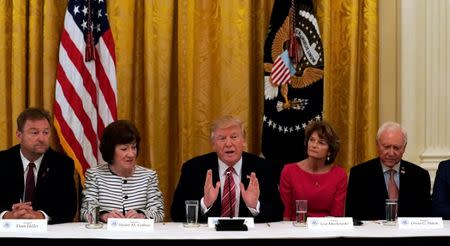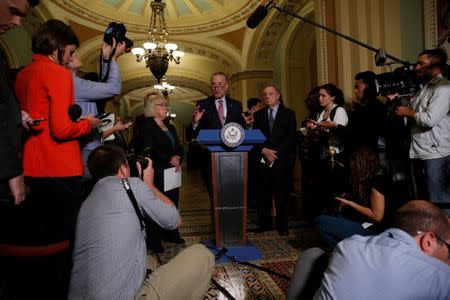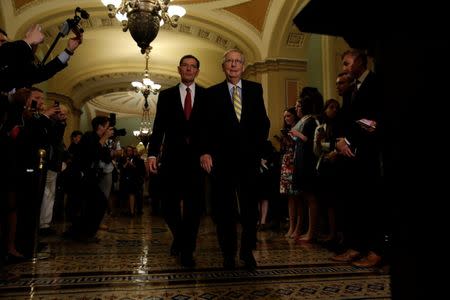Pence to join Senate Republican leaders in healthcare push
By Susan Cornwell and Richard Cowan
WASHINGTON (Reuters) - Republican leaders in the U.S. Senate pushed on Tuesday to gather enough support to pass a healthcare bill, but got little help from a report saying the measure would cause 22 million Americans to lose medical insurance over the next decade.
Vice President Mike Pence was expected to join Senate Republicans for a policy lunch on Capitol Hill before hosting conservative senators for dinner.
Senate Majority Leader Mitch McConnell will meet with senators who are undecided on the bill and who face questions from their governors and state Medicaid officials about potential cuts to the government insurance program for the poor and disabled, lawmakers said.
The analysis released on Monday by the nonpartisan Congressional Budget Office prompted Senator Susan Collins, a key moderate vote, to say she could not support moving forward on the bill as it stands.
At least four conservative Republican senators - Ted Cruz, Rand Paul, Ron Johnson and Mike Lee - said their opposition remained unchanged after the CBO analysis.
For more news videos visit Yahoo View, available on iOS and Android.
McConnell's goal has been to vote on the measure before the July 4 recess that starts at the end of the week, advancing a long-stated Republican aim to repeal and replace Obamacare and hand President Donald Trump a legislative win.
The majority leader can only afford to lose two Republican senators from the party's 52-seat majority in the 100-seat Senate to pass the bill. Democrats are solidly opposed and Pence would cast a tie-breaking vote.
Lawmakers' overlapping concerns and competing interests have presented McConnell with a balancing act. Moderate senators are concerned that millions of people would lose their insurance. Conservatives say the bill does not do enough to erase Democratic former President Barack Obama's signature domestic legislation.
Pence will host Lee and other conservative Republican senators at a dinner later Tuesday. James Lankford, Tom Cotton and Ben Sasse are also invited, Politico reported.
Collins, Paul and Johnson, along with Senator Dean Heller, have all said they will oppose a procedural motion to allow McConnell to move forward and bring the bill up for a vote.
Heller, a moderate Republican up for re-election next year in Nevada, is already facing political fallout after a group started by former Trump and Pence campaign aides promised to run ads against him.
Trump and most Republicans in Congress were elected on campaign pledges to replace Obamacare, a 2010 law that extended insurance coverage to some 20 million Americans through measures such as a mandate for individuals to buy insurance and expanded Medicaid.
Republicans have long condemned Obamacare as costly government intrusion. Now that they control the White House, Senate and House of Representatives, the pressure is on to deliver an alternative.
Senator Angus King, an independent, lamented the lack of presidential leadership to guide the legislation that he said runs counter to Trump's promises to insure everyone, cut costs and protect those with pre-existing conditions.
"He sort of stood on the sidelines and let these bills develop. He celebrated the House bill then said it was mean. I don't think he's getting into the details about what these bills actually do," King told MSNBC.
Marc Lotter, Pence's press secretary, was optimistic that Republican leaders would eventually be able to round up the needed yeas, saying McConnell would call a vote when "they have the votes together."
"You'll have some folks on either side of the spectrum trying to make adjustments here and there ... but at the end of the day you will see that Republicans will get this done because it's a rescue mission for the American people," Lotter told Fox News.
'BIGGEST SIGNATURE ISSUE'
The CBO assesses only the impact of legislation within a 10-year time frame, and said people losing insurance were expected to grow beyond 22 million after that, due to deep cuts to Medicaid not scheduled to go into effect until 2025. It would reduce the budget deficit by $321 billion between 2017 and 2026, the CBO estimated.
If the Senate passes a bill, it will either have to be approved by the House, which passed its own version last month, or the two chambers would reconcile their differences in a conference committee. Otherwise, the House could pass a new version and bounce it back to the Senate.
"It's the biggest signature issue we have, and it's the biggest promise we've ever made in the modern era," House Speaker Paul Ryan said in a Fox News interview that aired on Tuesday. "We did this in the House. It is now the Senate's turn. I think they're going to do it."
He defended the proposals amid the CBO's findings, telling Fox: "it's not ... that people are getting pushed off our plan. It's that people will choose not to buy something they don't like or want."
In its analysis of the House legislation last month, the CBO projected that some 23 million people would lose health insurance over the next decade.
Democrats remained united in opposition, blasting the Senate bill as a tax break for the wealthy that harms the nation's most vulnerable. But they have few options to block it beyond stirring public opposition and mounting pressure on wary Republicans.
(Additional reporting by Yasmeen Abulateb, Amanda Becker, Eric Walsh and Susan Heavey; Writing by Amanda Becker and Frances Kerry; Editing by Paul Tait and Jeffrey Benkoe)















